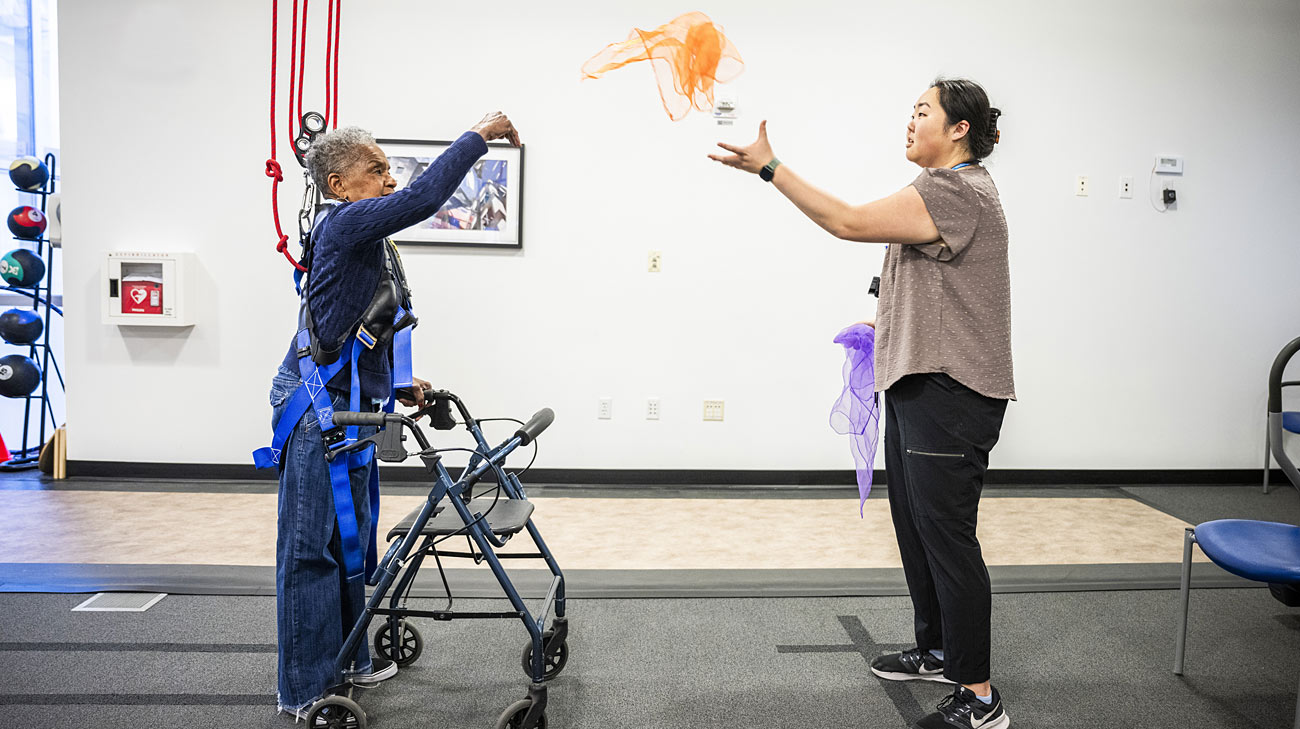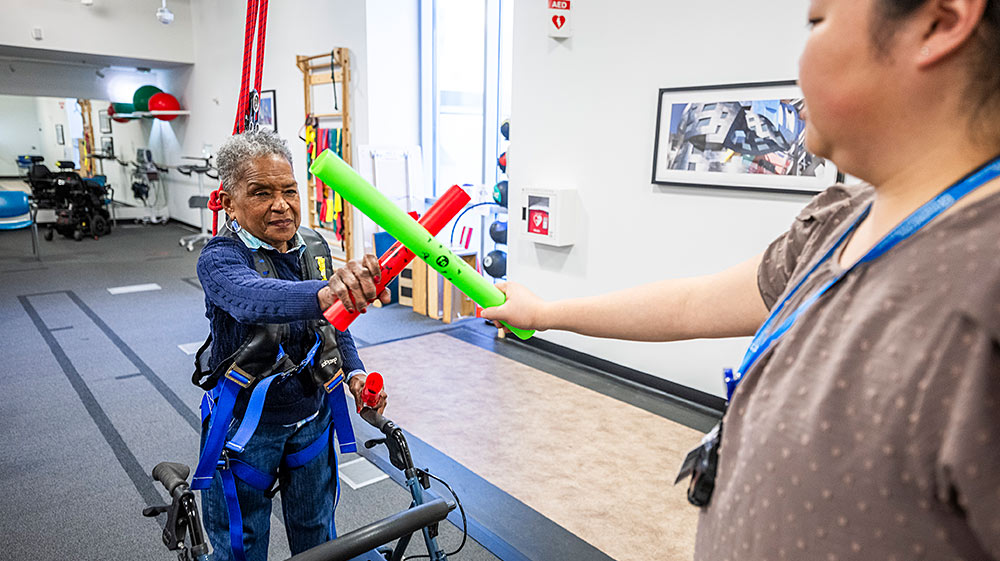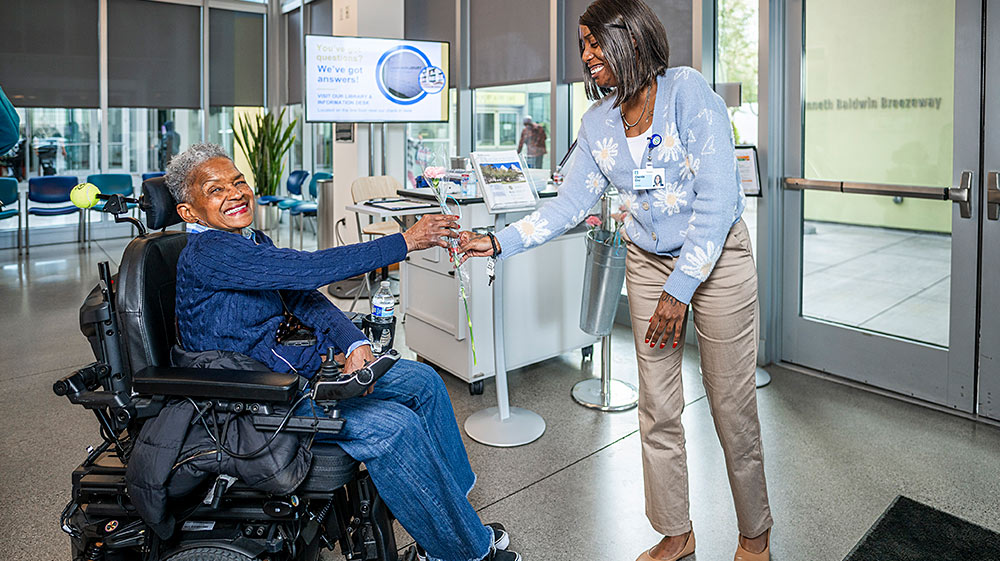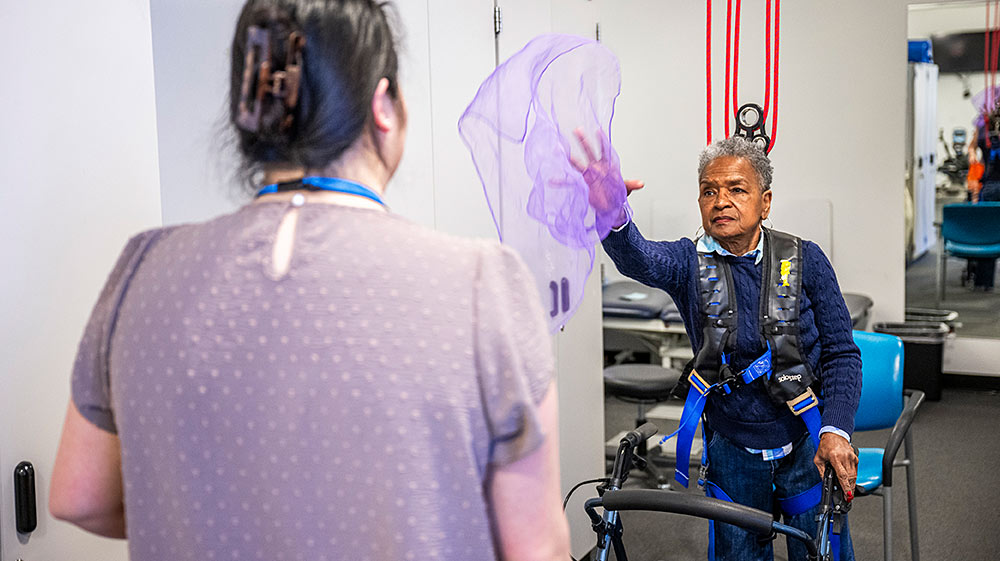
When Margo Waters’ doctor suggested she consider enrolling in a clinical trial of a new class of drugs that might help her neurodegenerative condition, her support system immediately encouraged her, suggesting this might be the answer she was seeking to help manage her disease.
It was the late 1990s and she had just been diagnosed with multiple sclerosis (MS), an autoimmune disease that causes the immune system to mistakenly attack the protective cover around nerves. This can cause muscle weakness, vision changes, numbness, fatigue and memory issues .
“I was running a hair salon and already having a lot of trouble walking,” remembers Margo, who was in her 40s at the time. “I was panicking and felt alone, because I didn’t know anyone else who had MS and I didn’t understand the changes happening in me.”

Margo works with a physical therapist on balance, strength and fatigue management.
While there is still no cure for MS, today there are over 25 treatment options, known as disease-modifying therapies, to help reduce relapses and even slow disease progression.
When Margo was diagnosed in 1995, the concept of disease-modifying therapies had just been introduced and she was among the first to try one, because of her decision to participate in a clinical trial of a potential new treatment.
That early decision to actively manage her MS continues to pay dividends today, and physical therapy has become her preferred prescription for maintaining an active lifestyle.
“When I moved to Las Vegas in 2021, I needed to find a neurologist to renew my medications. When I got to Cleveland Clinic, my doctor suggested we try something new. So, after more than 20 years of injections of interferon beta-1a from that original clinical trial, I stopped drug therapy and started physical therapy,” says Margo, now 71.

Margo receives a parting flower, a token of hospitality in Las Vegas.
Her neurologist, Le Hua, MD, director of the Multiple Sclerosis Program at Cleveland Clinic Lou Ruvo Center for Brain Health , has a special research interest in aging with MS.
“People are getting older, they are surviving with less disability, they are doing better. What we don’t want to do is inadvertently keep someone on a medication they no longer really need,” says Dr. Hua.
Traditionally, MS treatments target the overactive immune system, bringing it back into balance. But as we get older and the immune system naturally becomes less robust, individuals with MS experience less inflammation, fewer relapses and less MRI activity.
Dr. Hua tailors her evaluation to each individual’s situation, weighing negative side effects against troublesome symptoms. “More often than you might expect, I'll look back and say, ‘Well, you haven't had a relapse for five or 10 years, and your recent MRIs haven't shown any change. I think this might be an opportunity for us to stop medications.’”
In Margo’s case, Dr. Hua recommended starting different treatments – physical and occupational therapy – to focus on balance, strength, endurance, fatigue management and improving activities of daily living.
“This change in treatment plan is one of the reasons I knew I was at the right place. They didn’t just repeat the ‘same old, same old.’ They’re experts, have done the research, and evaluate me as an individual,” says Margo. “Physical therapy has given me the energy to be active every day.”
Energy she needs to keep up with a busy schedule. Margo works in guest services at two of Las Vegas’ largest venues. In the entertainment capital of the world, she has worked nearly every major sporting event, concert and headliner to come through since 2021.

Margo attends physical therapy to help improve activities of daily living.
“Life is good. In 2024, I got to make history as part of the very first Super Bowl in Las Vegas,” says Margo, who uses a mobility aid to navigate the concourses. “I surprise a lot of people when I tell them that despite having MS, I live a normal life just like everyone else – except I got to meet Shaquille O’Neal at the Super Bowl.”
A flexible work schedule that keeps her out in the community is also part of her MS treatment plan.
For people living with MS, long-term employment is associated with higher quality of life and better clinical outcomes. The social interaction that comes with employment is also associated with reduced physical and psychological symptoms.
Dr. Hua says, “Margo is managing a chronic disease that might prompt people to say, ‘Oh my gosh, you have MS! Are you ok?’ and through her positive approach to life, is changing their reaction to ‘I’m jealous of all the things you’re out doing in Las Vegas!’”
“I’m not just MS, I’m M.W., Margo Waters.”
Related Institutes: Neurological Institute

